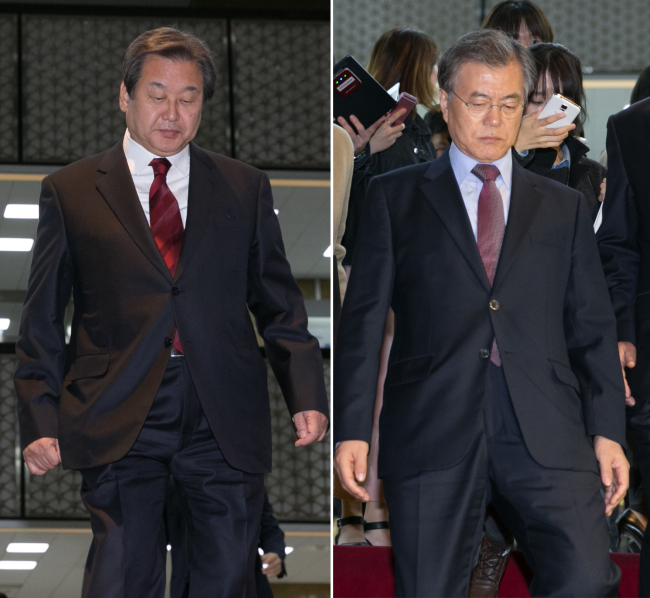The rival parties on Thursday failed to negotiate the redrawing of a new electoral map, missing the legal deadline and further complicating the political and partisan strategies for next year’s general elections.
Separate from the failed talks, the National Assembly passed a package of pending bills including a ban against large retailers doing business near traditional markets to jumpstart the parliamentary session, which has been stalled over the government’s push to reinstate state-authored textbooks.
While the ruling Saenuri Party and the main opposition New Politics Alliance for Democracy passed a motion to extend the operation of a committee dealing with electoral rules, they were required to vote their new electoral map by the Friday plenary session.
If the lawmakers fail to come up with new constituency maps by year-end, the country is to head to general elections without any electoral zones, as the efficacy of the current zones expire on Dec. 31.
The parties, however, have not met a single legal deadline for rezoning electorates since early 2000s.
The lawmakers have clashed over the rules that would determine the number of seats for the lawmakers elected through votes at local constituencies and the seats for those who obtain their parliamentary seats through proportional representation system.
The Saenuri Party has favored a plan to reduce the number of proportional representation seats, but the NPAD and another minor opposition party insist the 54 seats given to the proportional representation scheme remain the same as the current level.
The parties are to continue the negotiation at the extended electoral rules committee.
In a 188-14 vote, with 23 abstaining, the rival parties agreed to extend the committee’s operation — which was set to end on Nov. 15 — until Dec. 15.
 |
| The Saenuri Party leader Rep. Kim Moo-sung(left) and the NPAD leader Rep. Moon Jae-in. Yonhap |
Among the approved bills are a ban against large-scale grocery chains from opening up branches near small and local supermarkets and vendors.
The revised environment law would also give the government the right to demand and order adjustment to automobiles’ gas emission in case of flaws.
Meanwhile, the parties remain at odds over the bills that would overhaul rules in the labor market and business sectors.
The rival lawmakers have also clashed over how to fund the government’s child care program and whether to implement a policy to impose caps on skyrocketing housing prices. They have also remained split over the parliamentary approval of the ratification of the Korea-China Free Trade Agreement.
The legislative meeting came amid Cheong Wa Dae’s repeated calls for the lawmakers to take legislative action to jump-start the nation’s faltering economy. The presidential office highlighted that the pending contentious bills and the approval of the Korea-China FTA are “urgent.”
Dismissing speculation that a Cabinet shake-up is imminent, Cheong Wa Dae pressed lawmakers into passing the pending bills. Several Cabinet members are expected to be replaced, as some have already resigned and more are expected to leave their post to prepare for the 2016 general elections.
“The 19th Assembly is now in session. Among the parliamentary agenda items are bills related to reforming labor markets and boosting the economy, as well as the Korea-China FTA agreement. We sincerely hope the bills will be passed during the current parliamentary session,” Kim Sung-woo, senior presidential secretary of public affairs, said Thursday.
By Yeo Jun-suk (jasonyeo@heraldcorp.com)

